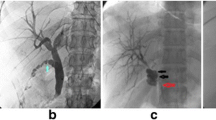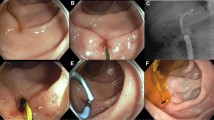Abstract
Objective
To compare the outcome of patients affected by biliary leak after major biliary surgery and treated with percutaneous transhepatic biliary drainage (PTBD) alone with that of similar patients treated with PTBD and concurrent positioning of an occlusion balloon (PTBD-OB).
Methods
We retrospectively reviewed the results of the use of PTBD or PTBD-OB performed at our institution from 2004 to 2008 in patients with post-surgical biliary leak. Sixteen patients entered the evaluation. PTDB alone was performed in 9 men (age 59.7 ± 13.4 years [mean ± standard deviation]; median 60 years), while PTBD-OB was performed in 7 patients (5 men, 2 women, age 71.3 ± 9.3 years; median 68 years).
Results
No significant difference between groups was found regarding age (p = 0.064) and sex (p = 0.175) distribution, number of procedures (3.1 ± 1.62; 2 vs 1.7 ± 1.1; 1, p = 0.151), and days of disease before recovery, death or modification of treatment (51.6 ± 66.8; 23 vs 18.6 ± 15.1; 14, p = 0.266). The number of patients treated with PTBD-OB who fully recovered (7/7, 100%) was significantly higher than that of patients treated with PTBD alone (4/9, 44%, p = 0.034).
Conclusion
This procedure appears to be clinically effective, being associated with a higher probability of recovery in patients treated for post-surgical biliary leak. Further studies are needed to confirm these preliminary results.


Similar content being viewed by others
References
Zyromski NJ, Lillemoe KD (2006) Current management of biliary leaks. Adv Surg 40:21–46
Pace RF, Blenkharn JI, Edwards WJ et al (1989) Intra-abdominal sepsis after hepatic resection. Ann Surg 209:302–306
Lam CM, Lo CM, Liu CL et al (2001) Biliary complications during liver resection. World J Surg 25:1273–1276
Righi D, Franchello A, Ricchiuti A et al (2008) Safety and efficacy of the percutaneous treatment of bile leaks in hepaticojejunostomy or split-liver transplantation without dilatation of the biliary tree. Liver Transpl 14:611–615
Kaffes AJ, Hourigan L, De Luca N et al (2005) Impact of endoscopic intervention in 100 patients with suspected postcholecystectomy bile leak. Gastrointest Endosc 61:269–275
Sandha GS, Bourke MJ, Haber GB et al (2004) Endoscopic therapy for bile leak based on a new classification: results in 207 patients. Gastrointest Endosc 60:567–574
Lee CS, Liu NJ, Lee CF et al (2008) Endoscopic management of biliary complications after adult right-lobe living donor liver transplantation without initial biliary decompression. Transplant Proc 40:2542–2545
Cozzi G, Severini A, Civelli E et al (2006) Percutaneous transhepatic biliary drainage in the management of postsurgical biliary leaks in patients with nondilated intrahepatic bile ducts. Cardiovasc Intervent Radiol 29:380–388
Kim JH, Ko GY, Sung KB et al (2008) Bile leak following living donor liver transplantation: clinical efficacy of percutaneous transhepatic treatment. Liver Transpl 14:1142–1149
Baker TA, Aaron JM, Borge M et al (2008) Role of interventional radiology in the management of complications after pancreaticoduodenectomy. Am J Surg 195:386–390
Yang JH, Shih JC, Liu KL et al (2007) Combined treatment with temporary intraoperative balloon occlusion of common iliac arteries and hysteroscopic endocervical resection with postoperative cervical balloon for intractable cervical pregnancy in an infertile woman. Fertil Steril 88:1438.e11–1438.e13
Karvonen J, Gullichsen R, Laine S et al (2007) Bile duct injuries during laparoscopic cholecystectomy: primary and long-term results from a single institution. Surg Endosc 21:1069–1073
Winter JM, Cameron JL, Yeo CJ (2008) Duodenojejunostomy leaks after pancreaticoduodenectomy. J Gastrointest Surg 12:263–269
Grobmyer SR, Pieracci FM, Allen PJ (2007) Defining morbidity after pancreaticoduodenectomy: use of a prospective complication grading system. J Am Coll Surg 204:356–364
Yeo CJ, Cameron JL, Sohn TA et al (1997) Six hundred fifty consecutive pancreaticoduodenectomies in the 1990s: pathology, complications, and outcomes. Ann Surg 226:248–257
Vin Y, Sima CS, Getrajdman GI et al (2008) Management and outcomes of postpancreatectomy fistula, leak, and abscess: results of 908 patients resected at a single institution between 2000 and 2005. J Am Coll Surg 207:490–498
Jarnagin WR, Gonen M, Fong Y et al (2002) Improvement in perioperative outcome after hepatic resection: analysis of 1,803 consecutive cases over the past decade. Ann Surg 236:397–406
Aytekin C, Boyvat F, Harman A (2007) Percutaneous management of anastomotic bile leaks following liver transplantation. Diagn Interv Radiol 13:101–104
Ernst O, Sergent G, Mizrahi D (1999) Biliary leaks: treatment by means of percutaneous transhepatic biliary drainage. Radiology 211:345–348
Sohn TA, Yeo CJ, Cameron JL et al (2003) Pancreaticoduodenectomy: role of interventional radiologists in managing patients and complications. J Gastrointest Surg 7(2):209–219
Kaufman SL, Kadir S, Mitchell SE et al (1985) Percutaneous transhepatic biliary drainage for bile leaks and fistulas. AJR Am J Roentgenol 144:1055–1058
Burke DR, Lewis CA, Cardella JF et al (2003) Society of interventional radiology standards of practice committee. quality improvement guidelines for percutaneous transhepatic cholangiography and biliary drainage. J Vasc Interv Radiol 14:S243–S246
Weber A, Gaa J, Rosca B et al (2008) Complications of percutaneous transhepatic biliary drainage in patients with dilated and nondilated intrahepatic bile ducts. Eur J Radiol. Epub Oct 14. doi:10.1016/j.ejrad.2008.08.012
Smith AC, Shapiro RH, Kelsey PB et al (1986) Successful treatment of nonhealing biliary-cutaneous fistulas with biliary stents. Gastroenterology 90:764–769
Vaccaro JP, Dorfman GS, Lambiase RE (1991) Treatment of biliary leaks and fistulae by simultaneous percutaneous drainage and diversion. Cardiovasc Intervent Radiol 14:109–112
Trerotola SO, Savader SJ, Lund GB et al (1992) Biliary tract complications following laparoscopic cholecystectomy: imaging and intervention. Radiology 184:195–200
Hunt JA, Gallagher PJ, Heintze SW et al (1997) Percutaneous microcoil embolization of intraperitoneal intrahepatic and extrahepatic biliary fistulas. Aust NZ J Surg 67:424–427
Funaki B, Zaleski GX, Straus CA et al (1999) Percutaneous biliary drainage in patients with nondilated intrahepatic bile ducts. AJR Am J Roentgenol 173:1541–1544
Author information
Authors and Affiliations
Corresponding author
Rights and permissions
About this article
Cite this article
Pedicini, V., Poretti, D., Mauri, G. et al. Management of post-surgical biliary leakage with percutaneous transhepatic biliary drainage (PTBD) and occlusion balloon (OB) in patients without dilatation of the biliary tree: preliminary results. Eur Radiol 20, 1061–1068 (2010). https://doi.org/10.1007/s00330-009-1637-6
Received:
Revised:
Accepted:
Published:
Issue Date:
DOI: https://doi.org/10.1007/s00330-009-1637-6




